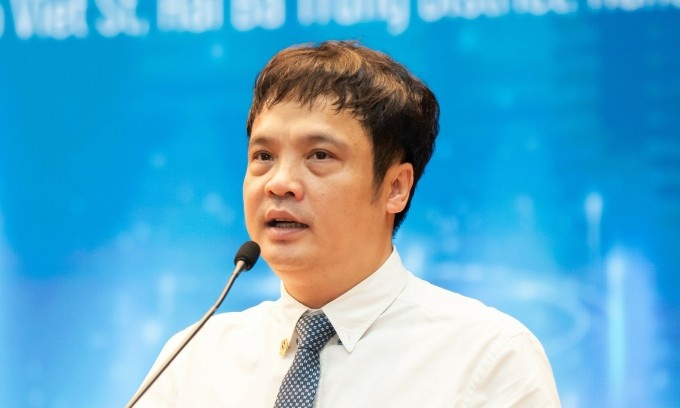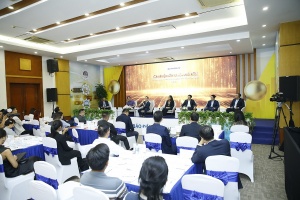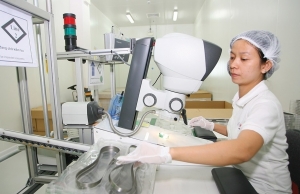Hanoi eyes semiconductor industry growth with new strategic initiatives
 |
| Nguyen Van Khoa, chairman of the Vietnam Software and IT Services Association (Vinasa) |
At an investment and development conference for the semiconductor industry in Hanoi on July 29, Nguyen Van Khoa, chairman of the Vietnam Software and IT Services Association (Vinasa), highlighted Hanoi's potential to advance in high-tech sectors, particularly semiconductors. This potential has been bolstered by the revised Capital Law passed in June, which prioritizes semiconductors as a key area for attracting strategic investors.
"This legal framework is crucial. Hanoi, with its population of over 10 million and significant economic and social appeal, must seize this opportunity to elevate its status in the domestic and global technology and semiconductor sectors," Khoa stated.
To capitalise on this potential, Khoa suggested that Hanoi should develop specific mechanisms and criteria to identify strategic investors eligible for preferential policies. He also recommended that Hanoi create a long-term strategy spanning ten years, learning from countries with established ecosystems for training, supplying, and manufacturing electronic and chip equipment.
Currently, Hanoi holds a small share of Vietnam's semiconductor industry in terms of both the number of enterprises and workforce. Major international companies such as Intel, Renesas, and Marvell are headquartered in Ho Chi Minh City, while Hanoi is home to design firms like Qorvo, CoAsia, and Toshiba. Of the more than 5,000 chip design engineers in Vietnam, 85 per cent are based in Ho Chi Minh City, 8 per cent in Hanoi, and 7 per cent in Danang.
Khoa highlighted the need for Hanoi to allocate resources to support tech enterprises and innovation, particularly in the semiconductor field.
"Chip production and design encompasses a vast landscape, with both large corporations and smaller enterprises. Hanoi needs to support the emergence of more companies to build a robust ecosystem," he said.
At the event, Vo Xuan Hoai, deputy director of the Vietnam National Innovation Centre (NIC), noted the semiconductor industry's strong growth potential, evidenced by the entry of leading global corporations and major domestic firms. The development focus will be on Hanoi, Danang, and Ho Chi Minh City.
"One of Hanoi's advantages is the recently enacted revised Capital Law, which prioritizes the development of science and technology, innovation, and high-tech zones, offering investment incentives. Hanoi has already attracted major global tech companies like Nvidia, Apple, SpaceX, and Qorvo," Hoai shared.
Nguyen Viet Hung, director of the Department of Information and Communications, mentioned that the Capital Law designates digital technology as a key area of sci-tech.
"Hanoi is piloting a venture capital fund using the state budget to invest in high-tech enterprises. Suitable projects can receive incentives such as land and water surface rent reductions, personal and corporate income tax breaks, and prioritized customs procedures," Hung explained.
Additionally, Hung pointed out that Hanoi hosts several universities that train workers for the semiconductor field, including Hanoi University of Science and Technology, University of Engineering and Technology, Posts and Telecommunications Institute of Technology, and FPT University. Surrounding the city are ten high-tech zones covering more than 1,700 hectares.
"Hoa Lac Hi-Tech Park aims to become a centre for research, development, testing, application of high technology, and production of high-tech products, as well as a key innovation hub for Hanoi and the nation," Hung added.
Looking ahead, the city plans to focus on various tasks and solutions to develop digital technology enterprises, including semiconductor businesses. These efforts will include promoting scientific and technological research, public awareness campaigns, digital infrastructure development, market creation, and the issuance of appropriate policies.
| Hanoi steps into semiconductor development race With its strategic location and advantages, Hanoi is moving to attract resources for the development of the semiconductor industry. |
 | Appetite for high-growth stocks linked to semiconductors, AI and digital assets Investors are scouting for high-growth stocks related to semiconductors and AI as well as acquiring digital assets, heard a recent panel discussion about investment opportunities in H2. |
 | The microchip allure for big players Vietnam boasts some strategic advantages that can lure some of the biggest economies to invest in its industrial hubs. Manager Ly Nguyen and associate Tu Nguyen of the Tony Blair Institute Vietnam pore over the investment preferences of European and the US investors in industrial parks for semiconductors. |
What the stars mean:
★ Poor ★ ★ Promising ★★★ Good ★★★★ Very good ★★★★★ Exceptional
 Tag:
Tag:
Related Contents
Latest News
More News
- SK Innovation-led consortium wins $2.3 billion LNG project in Nghe An (February 25, 2026 | 07:56)
- THACO opens $70 million manufacturing complex in Danang (February 25, 2026 | 07:54)
- Phu Quoc International Airport expansion approved to meet rising demand (February 24, 2026 | 10:00)
- Bac Giang International Logistics Centre faces land clearance barrier (February 24, 2026 | 08:00)
- Bright prospects abound in European investment (February 19, 2026 | 20:27)
- Internal strengths attest to commitment to progress (February 19, 2026 | 20:13)
- Vietnam, New Zealand seek level-up in ties (February 19, 2026 | 18:06)
- Untapped potential in relations with Indonesia (February 19, 2026 | 17:56)
- German strengths match Vietnamese aspirations (February 19, 2026 | 17:40)
- Kim Long Motor and AOJ Suzhou enter strategic partnership (February 16, 2026 | 13:27)





















 Mobile Version
Mobile Version